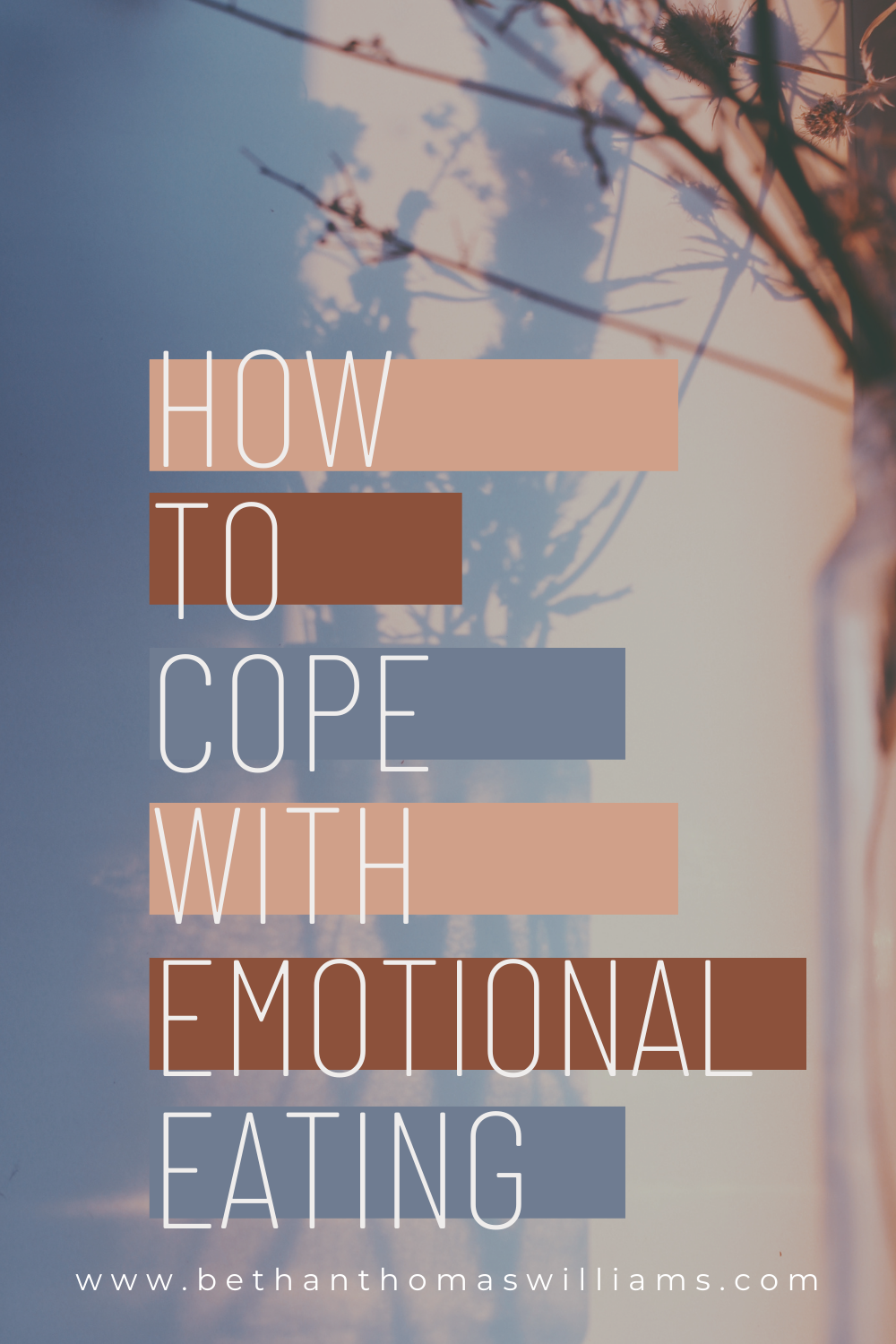Are you an emotional eater?
If you are, you are not alone. There are so many people out there, especially mums, who find themselves turning to food for comfort in times of stress (or for other reasons too!) and it’s normal.
I think when we think of emotional eating, we picture a sobbing woman crying into an icecream tub after going through a breakup – but while it can be, that’s not really what emotional eating looks like for most of us.

Let’s just clear this up first
Emotional eating isn’t always a bad thing.
We are emotional beings and since we have been born food has been linked to our emotions. We would get comfort from being fed as a baby, if there was a party there is food, if there is a funeral there is food, we go out for a meal to celebrate or we take food to show our support for someone e.g. new baby, grief, a break up etc.
So really, when we think about it like that it’s not a huge surprise that food can become a source of coping for us when we are stressed or feeling emotional.
The problem with it occurs when it is our ONLY coping mechanism. When we feel like it’s becoming an out of control issue.
Turning to food sometimes when we feel like we need a bit of emotional support is okay. I’m sure you can think of a lot worse things you could be doing to cope – but if every single time something stressful or an uncomfortable feeling arises you turn to food then it may be becoming something that needs addressing.
It’s important to remember as well that food isn’t JUST for giving us energy – we get enjoyment out of food and eating emotionally sometimes is completely okay.

So what is emotional eating?
Emotional eating is eating outside of times when you are hungry and usually you eat past feeling comfortably full.
You can find yourself emotionally eating when things are stressful, but you can eat for any emotional reason – anxiety, sadness, anger or frustration or even boredom for example.
Even though it provides a bit of temporary relief, it’s not actually helping with whatever has caused you to emotionally eat in the first place and you can end up feeling even worse after the feel good effect wears off and the feelings of guilt and uncomfort sneak in.
We can find ourselves in a bit of a viscious cycle where we feel bad and so we eat, and then that leaves us feeling bad again and we end up reaching for food again to make ourselves feel better – and the cycle continues.
Occasional emotional eating isn’t going to be much of an issue, especially if you have plenty of other coping mechanisms in place, but if it is more common then your health might start to suffer because of it.
When we turn to food to help us cope we tend to go for the less nutritious options that are higher in sugar, salt and fat and while eating these foods as part of a balanced diet is perfectly fine and not a problem at all – if you are eating them because you are bored or stressed you are likely eating much more than you need to be eating which could put you at risk of some health problems, such as:
- weight gain
- digestive issues
- bloating and digestive discomfort
- unable to tune into your hunger and fullness signals
- feeling anxious or negative
- having an impact on your relationship with your body and/or your relationship with food
Why am I emotionally eating?
There are many different reasons that you might be emotionally eating.
The most important thing is to understand if you are actually emotionally eating or if you are just hungry.
If you try to control your portion sizes, try and restrict what you eat or skip meals there is a chance that you are not eating quite enough throughout the day and the feelings that are making you eat outside of meal times when you are not actually hungry might actually be hunger that you are feeling.
We need to be aiming for three balanced meals a day and two snacks (if you need them). We need to be tuning into our hunger and fullness cues to work out how much we need and when we need it.
Check in here first to make sure you are actually eating enough food and that you are getting a good variety of foods in your diet.
Another important thing to take note of is if you are restricting.
Restricting food – for example not eating certain foods or trying to limit what you eat – can make it much harder to feel in control around that food, so when something stressful happens or you feel an uncomfortable emotion you can find yourself saying ‘sod it’ and using it as an excuse to just eat that piece of cake or whatever it is that you were restricting.
The main reason that people eat emotionally is because they have unmet emotional needs and they are using food to fill that gap.
But the reality is that food will never fill that gap – for example if you are feeling unfulfilled in your life, eating a slice of cake isn’t going to fix that issue for you – it might temporarily make you feel better and forget about it for a little bit – but it isn’t going to let you start living out your life’s purpose.

How to cope with emotional eating
If you have identified that you are an emotional eater then here are some tips to help you stop feeling like you are stuck relying on food to cope.
It might take a bit of time, you are not going to go from being an emotional eater to not turning to food every single time over night but here are some tips to be mindful of and to help get you started.
- Make sure you are eating regularly – aim for three meals a day and two snacks.
I’ve written a blog post all about creating balanced plates here. Try and aim to eat a variety of food and not the same meals on repeat so that you are getting a good balance of micro and macro nutrients and that will help. - Move
Movement is so important, it helps us feel so much better. It’s important to find a movement that you really love and that you look forward to (blog post all about that here) – take away the idea that you have to exercise for weight loss and instead do it for all the other benefits it brings like managing stress and regulating your appetite. - Tune into your hunger and emotions
Are you actually hungry right now? Or are you eating to try and ‘fix’ and emotion. What is that emotion? Name it. Is food going to fix it? Unless it’s hunger it is unlikely.
If you are not sure what is you are feeling you can try using a feelings wheel to dig deeper and to work out specifically what emotion you are feeling. - Then Make a plan
So you have identified the emotion you are feeling, you have decided that hunger won’t fix it – so what will?
Grab a piece of paper or open your notes app and brainstorm what will help you feel better with this problem.
It might not help you this time, but start doing the things on that list.
For example, if you notice you feel bored have a list handy on your phone of things you can do to take your mind of it like phone a friend, play a game for ten minutes on your phone, do a crossword, clean out a drawer etc
5. Notice your triggers
Is there a certain situation that always ends with you emotionally eating? What can you do to minimise that trigger or prepare yourself so you don’t emotionally eat?
e.g. I know hospital appointments are a trigger for me so I make sure I take a snack with me to appointments to eat when I get out so I feel more in control rather than getting home and eating anything I can get my hands on.
6. Change your environment
This one is under rated. Move to a different room. Go outdoors. Just change the scenery and see if that helps.
7. Reduce Stress
We can’t always easily fix the thing that is making us feel stressed, but reducing stress in your life as a whole can make those things a bit easier to deal with and make you less likely to turn to food.
8. Sleep
There is nothing that can’t be helped by sleeping more. Read this post here if you need to some more help with sleep!
Sometimes emotional eating can become a habit and an environment can trigger it – such as eating in front of the TV at night.
Moving to a different space and taking a deep breath can help clear things.

I hope this helps you to understand what emotional eating is and to give you some tips to help with it.
There will be a course coming soon on helping you to overcome emotional eating so watch this space! Or if you would like to work 1:1 to help you with this just let me know.
Beth x